
POST-SOVIET AFFAIRS
Scope & Guideline
Illuminating the Path of Post-Soviet Transformations
Introduction
Aims and Scopes
- Political Dynamics and Authoritarianism:
Analysis of authoritarian regimes and political transitions in post-Soviet states, examining governance structures, elite behavior, and public attitudes towards authority. - Socioeconomic Challenges and Resilience:
Exploration of economic policies, welfare systems, and public welfare under authoritarian regimes, focusing on how states manage social stability amid crises. - Cultural and Ideological Narratives:
Investigation of the ideological frameworks and cultural narratives that shape politics in the region, including nationalism, identity, and historical memory. - Regional Conflicts and Security:
Study of geopolitical tensions and security issues, particularly in relation to Russia's foreign policy, military interventions, and the implications for neighboring countries. - Media and Communication Studies:
Research on the role of media in shaping public perception, political discourse, and social movements, particularly in authoritarian settings.
Trending and Emerging
- Impact of the Russo-Ukrainian War:
Research on the implications of the ongoing conflict between Russia and Ukraine has surged, exploring its effects on national identity, regional stability, and international relations. - Authoritarian Resilience and Governance Strategies:
An increasing focus on how post-Soviet regimes maintain power and manage dissent, particularly in the context of economic crises and social unrest. - Public Attitudes and Social Movements:
Growing interest in public sentiment, protest movements, and civil society responses to government policies and authoritarianism, emphasizing grassroots activism. - Transnational Issues and Regional Interactions:
Emerging studies on transnational connections among post-Soviet states, including migration, economic ties, and shared security concerns, reflecting a more interconnected approach. - Media Influence and Disinformation Strategies:
Heightened analysis of media's role in shaping political narratives and the use of disinformation as a tool for state control and propaganda.
Declining or Waning
- Historical Analyses of Early Post-Soviet Transitions:
Research focusing on the immediate aftermath of the Soviet Union's dissolution has decreased, likely overshadowed by current events and pressing contemporary issues. - Explorations of Western Influence and Democracy Promotion:
The discourse surrounding Western interventions and democracy promotion in post-Soviet states has waned, as the focus has shifted to analyzing local dynamics and authoritarian consolidation. - Comparative Studies with Non-Post-Soviet Contexts:
Comparative analyses that include non-post-Soviet states have declined, with a more concentrated focus now on intra-regional dynamics and specific case studies within the post-Soviet space.
Similar Journals
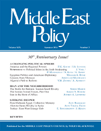
MIDDLE EAST POLICY
Bridging Theory and Practice in Regional Policy AnalysisMIDDLE EAST POLICY stands as a notable journal in the fields of Political Science and International Relations, published by Wiley in the United Kingdom. With a rich publication history dating back to 1992, this journal provides a critical platform for scholarly exploration and dialogue surrounding Middle Eastern political dynamics and policies. It ranks in the Q3 category in the 2023 evaluations for both Political Science and International Relations and Sociology, indicating its influential role in these academic fields. While it does not offer open access, it is recognized for its rigorous peer-reviewed articles that contribute valuable insights and analyses on pressing regional challenges and institutional frameworks. Researchers, professionals, and students engaged in Middle Eastern studies will find MIDDLE EAST POLICY essential for understanding the complex socio-political landscapes of the region and for fostering informed discussions that advance both scholarship and practice.
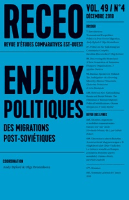
REVUE D ETUDES COMPARATIVES EST-OUEST
Unlocking Perspectives: Comparative Studies for a Global DialogueREVUE D ETUDES COMPARATIVES EST-OUEST is a distinguished academic journal published by PRESSES UNIV FRANCE, dedicated to the critical exploration of comparative studies in the social sciences, particularly focused on Finance and Political Science. Operating since its inception in 1978, this journal has evolved into an essential resource for researchers examining the dynamics between Eastern and Western paradigms, offering insights that bridge regional perspectives. Although it holds a Q4 classification in both Finance and Political Science and International Relations categories for 2023, it serves as a platform for emerging voices and established scholars alike to publish meaningful research. With Scopus rankings placing it within the 33rd percentile for Political Science and 13th percentile for Finance, the journal continues to foster scholarly dialogue and encourages submissions that contribute to the broader understanding of comparative analysis. While currently not an open-access journal, it provides a valuable forum for innovative research that can significantly impact both academic and policy-making communities. This makes REVUE D ETUDES COMPARATIVES EST-OUEST an important journal for anyone looking to deepen their understanding of international relationships and economic interactions.
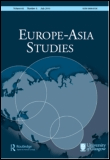
EUROPE-ASIA STUDIES
Unpacking socio-economic landscapes across continents.EUROPE-ASIA STUDIES, published by Routledge Journals, Taylor & Francis Ltd, is a prestigious academic journal that bridges the interdisciplinary gaps between economics, history, sociology, and geography, offering a comprehensive analysis of the dynamic relationship between Europe and Asia. Since its inception in 1993, the journal has become a crucial platform for scholars to share innovative research, evidenced by its notable rankings in the 2023 category quartiles, achieving Q1 status in History and Sociology and Political Science, and Q2 in Economics and Geography. With an impact factor that reflects its significance in the field, authors and researchers are encouraged to engage with its rigorous and thought-provoking contributions, fostering a greater understanding of cross-continental issues. Situated in the United Kingdom, EUROPE-ASIA STUDIES also provides a vital forum for emerging topics, facilitating discourse on the evolving socio-economic landscapes of both regions. Whether you're a researcher, professional, or student, this journal is essential for anyone invested in the nuanced examination of Europe-Asia relations.
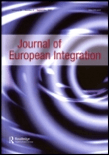
Journal of European Integration
Connecting Scholars to the Heart of European StudiesJournal of European Integration is a leading academic journal dedicated to the study of European politics and the dynamics of European integration. Published by Routledge Journals, part of the esteemed Taylor & Francis Ltd, this journal has established itself as a premier outlet for high-quality research, reflected in its Q1 category rankings in both Political Science and International Relations, as well as in Sociology. With a robust publication history spanning from 1977 to 2024, it offers vital insights into the complexities of political structures and societal impacts within Europe. Notably, it ranks in the 95th percentile in Political Science and International Relations and the 92nd percentile in Sociology, presenting a significant platform for scholars and practitioners alike. Although it does not currently offer Open Access options, the journal's comprehensive content serves as an essential resource for those engaged in understanding contemporary European issues and policy debates. Researchers, professionals, and students will find the Journal of European Integration to be an indispensable source of knowledge and academic discourse.

Insight Turkey
Navigating the Complexities of Political Science and SociologyInsight Turkey is a leading academic journal published by the SETA Foundation, focusing on pivotal issues within the realms of Political Science and International Relations. By offering a platform for scholarly discussion, the journal provides critical analyses and informed perspectives on socio-political dynamics in Turkey and beyond, making it essential reading for researchers, professionals, and students alike. With an ISSN of 1302-177X and an E-ISSN also of 1302-177X, Insight Turkey is recognized within academic circles, reflected by its positioning in the Q3 quartile for both Political Science and Sociology by 2023 rankings. This journal not only contributes significantly to its fields, ranking #463 out of 706 in Political Science and #981 out of 1466 in Sociology, but it also engages with contemporary issues critically and cross-disciplinarily. Although it currently does not offer open access, Insight Turkey remains a valuable resource for those invested in understanding the complexities of political landscapes and social phenomena, with publications running from 2009 to 2024. For academics looking to deepen their insights and engage with emerging research, Insight Turkey is an indispensable asset.
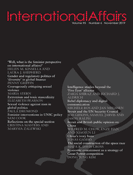
INTERNATIONAL AFFAIRS
Championing Rigorous Scholarship in International RelationsINTERNATIONAL AFFAIRS, published by OXFORD UNIVERSITY PRESS, stands as a premier journal in the fields of political science and international relations, boasting an impressive Impact Factor and a reputation for rigorous scholarship. Established in the United Kingdom, the journal's ISSN is 0020-5850 and its E-ISSN is 1468-2346. From its inception to the present, it has played a crucial role in analyzing and interpreting global issues that shape our world, with a notable mention of its Q1 quartile ranking in both Political Science and Sociology according to 2023 metrics. Researchers and practitioners alike benefit from its high-quality, peer-reviewed articles, which consistently rank it in the top percentile of its category, underscoring its significance in contemporary discourse. As the journal continues to evolve, it remains a vital resource for those looking to deepen their understanding of international affairs and sociopolitical dynamics.
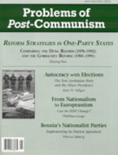
PROBLEMS OF POST-COMMUNISM
Unraveling the Complexities of TransformationPROBLEMS OF POST-COMMUNISM is a distinguished academic journal focused on the critical examination of political, social, and economic transformations in post-communist societies. Published by Routledge Journals, Taylor & Francis Ltd, this journal features an ISSN of 1075-8216 and an E-ISSN of 1557-783X. With an impressive ranking of Q2 in the fields of Sociology and Political Science, and a Scopus position of #290/1466 (80th percentile), it stands as a vital resource for researchers and practitioners alike. The journal spans a convergence of years from 1996 to 2024, offering a rich archive of scholarship. Although it does not currently provide open access options, its rigorous peer-reviewed articles delve into the intricate dynamics shaping post-communist states, making significant contributions to contemporary academic discourse. Addressed to an audience keen on understanding the societal shifts and challenges facing these regions, PROBLEMS OF POST-COMMUNISM is essential for anyone seeking insightful analyses and robust dialogue in this evolving field.

Recent Period Turkish Studies-Yakin Donem Turkiye Arastirmalari
Advancing Insights into Turkey's Evolving IdentityRecent Period Turkish Studies-Yakin Donem Turkiye Arastirmalari, published by ISTANBUL UNIV, is an esteemed open-access journal dedicated to the exploration and analysis of contemporary Turkish studies. Since its inception in 2002, the journal has provided a vital platform for researchers, scholars, and students to disseminate their findings on diverse aspects of Turkey's socio-political landscape, historical context, and cultural dynamics. With its impressive Q2 ranking in History and its participation in the competitive quartiles of Sociology and Political Science, the journal situates itself as a valuable resource for academia. Covering converged years from 2019 to 2023, it invites contributions that deepen the understanding of Turkey's evolving identity in a globalized world. The journal's aim is to foster scholarly dialogue and provide an inclusive space for interdisciplinary research, enhancing its impact and reach within the global academic community. Researchers interested in innovative perspectives and rich scholarly discourse are encouraged to engage with this influential publication.
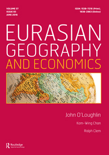
EURASIAN GEOGRAPHY AND ECONOMICS
Unveiling the Forces Shaping Eurasian Landscapes and EconomiesEURASIAN GEOGRAPHY AND ECONOMICS, published by Routledge Journals, Taylor & Francis Ltd, is a premier academic journal that delves into the intricate interplay between geographic and economic forces shaping the Eurasian region. With an impressive impact factor and ranked in the top quartile (Q1) for both Economics and Geography in 2023, this journal serves as an essential resource for researchers, professionals, and students alike. The journal spans a diverse range of topics from spatial analysis to economic development, contributing significantly to our understanding of these dynamic fields. As it celebrates its convergence from 2002 to 2024, EURASIAN GEOGRAPHY AND ECONOMICS continues to foster scholarly dialogue with its innovative open-access options, ensuring that vital research is widely accessible. Explore the latest findings, trends, and methodologies presented by leading experts in the field, and engage with the high-quality, impactful studies that make this journal a cornerstone of academic excellence.

SIYASAL-Journal of Political Sciences
Unveiling Insights into Contemporary PoliticsSIYASAL-Journal of Political Sciences, published by ISTANBUL UNIVERSITY, stands at the forefront of research in the field of political science. Recognized for its commitment to open access publishing since 2017, this journal facilitates the dissemination of high-quality scholarly articles that address emerging trends and critical issues in political theory, comparative politics, and international relations. With a growing readership worldwide, SIYASAL aims to foster inclusive discourse and stimulate academic collaboration among researchers, professionals, and students alike. The journal's innovative approach and rigorous peer-review process ensure that it remains a valuable resource for those seeking to deepen their understanding of contemporary political dynamics. Housed in the vibrant academic environment of Istanbul, it serves not only as a platform for original research but also as a space for intellectual exchange and the exploration of diverse political perspectives.